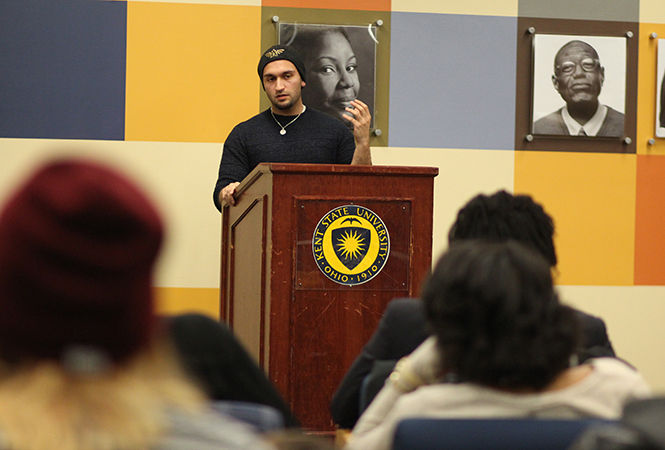Vigil for unity: Students gather to celebrate lives of Chapel Hill victims
Students bowed their heads in silence and came together for a larger cause despite the freezing temperatures and blowing snow: unity.
“A member from the Muslim Students Association said this pretty well… ‘These are three people I could’ve been friends with,’” said Rami Kalash, senior integrated life sciences major.
Students paid their respects to the three Muslim students killed in Chapel Hill, North Carolina, on Feb. 10 at a candlelight vigil on Risman Plaza and in the Multicultural Center on Wednesday night.
However, topics dove deeper than the deaths of Deah Barakat, Yusor Abu-Salha and Razan Abu-Salha.
Craig Hicks, the 46-year-old Chapel Hill native, was indicted Monday by a grand jury on three accounts of murder against his neighbors, along with discharging a firearm into an occupied dwelling. Hicks’ rage, according to police, was sparked by a parking dispute.
However, family and friends call for the killings to be identified as a hate crime. In 2013, the FBI identified nearly 6,000 hate crime incidents, affecting roughly 7,000 victims. Discrimination against minorities has been a topic of main concern not only in federal courts but also on Kent State’s campus.
Suzan Abdel-Jalil, a senior double-majoring in biology and psychology, let out a stifled laugh after being asked if she had ever felt some sort of discrimination in being a Muslim student. Abdel-Jalil is also a member of the Students for Justice in Palestine.
Students attend vigil for those killed at Chapel Hill from KentWired.com on Vimeo.
“Every time (Students for Justice in Palestine) does an event, I feel like we’re being watched,” Abdel-Jalil said. “It’s crazy… and I don’t know if I’m paranoid, but our signs have been torn down, and racist stuff has been written on our signs.”
Abdel-Jalil touched on the Islamophobia present in America and its roots in 9/11. She asked the audience to reflect on recent box-office hit, “American Sniper,” and how hate and discrimination have flourished since the showing.
“As an activist, I don’t want Yusor, Deah and Razan to be forgotten. Question the media — ask why. Why did it take two days for the U.S. to report on this event, two days after European countries?” Abdel-Jalil said. “Question the media… this is a hate crime.”
Amanda Paniagua, graduate art history student, said discrimination is put in place by the media. When asked by a member of the Black United Students how the audience felt after discovering the deaths of the three students, she spoke out, “I can’t take another article.”
However slow the media coverage of the issue seemed, the hashtags following the event were not. #MuslimLivesMatter, with #AllLivesMatter following, led millions of tweets to discuss the murders in Chapel Hill.
“All lives do matter… OK, yes, we know that — what we’re saying is, according to the media, some lives matter more than others,” Paniagua said.
Kalash said the media is concerned with the wrong target. Media overlooking the deaths of the three students is not the answer to acceptance and humanity.
“It seems like radicals are being covered more and more, and it seems like the only radicals the media are covering are people who claim to be Muslim extremists,” Kalash said. “From the Muslim perspective, this is something we want out there. This is something we want covered.”
Paniagua said students are afraid to speak about such a challenging topic.
“We are the generation that’s afraid of coming off as racist, but it’s not racist to talk about racism,” Paniagua said, “What is racist is to avoid the conversations and remain ignorant.”
Kalash, a member of the Muslim Students Association, led the group in an Arabic prayer honoring the lives of the three students. Later, Kalash spoke of unity — a common theme of the night.
It was for these reasons nearly 100 students joined together outside in the cold and circled around different speakers during the vigil. Noura Barazi, senior psychology major, and sister Bayann Barazi, freshman biology major, described in their own words what the term unity meant to them.
“It’s not just about one group,” Noura said. “The important aspect is diversity, and coming together no matter what color you are and showing people you can be civil to come together as one.”
“It’s about having no bias, being a whole, putting aside differences and coming together,” Bayann said.
Several student organizations were represented in the vigil. The Black United Students deemed 2015 “the year of action — to fight against people like Craig Hicks” and to celebrate the lives of Deah, Yusor and Razan, rather than bring Hicks’ name into the vigil’s sacred circle. The Humanist Society spoke of similarities between all humans and the need for humanity itself in these challenging times.
To close, Kalash and a member from the United Christian Ministries described a “call to action.” Penny Wars to promote a peaceful war for unity will be held in the Student Center lobby starting Monday, March 2. Classes will compete to raise the most money for Deah Barakat’s philanthropy of choice, Project Refugee Smiles. Project Refugee Smiles works to provide children in Syria with sufficient dental care. Since the death of Deah, the organization has raised nearly $500,000. The call to action hopes to unite students and keep the souls of Deah, Yusor and Razan alive.
Contact Payton Moore at [email protected].



